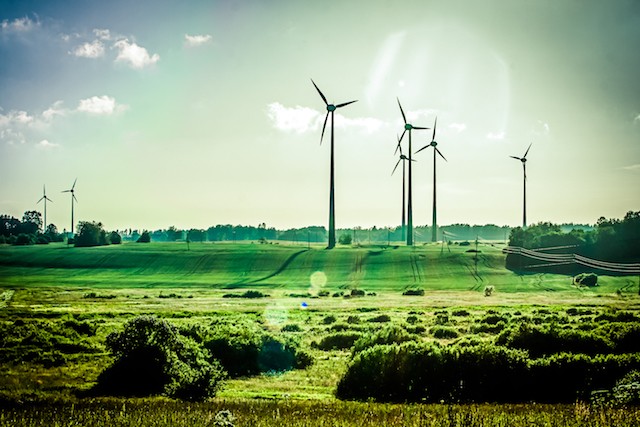Jesse Peters is a U.S. Marine Corps veteran, cannabis entrepreneur, grower, and activist. Now, thanks to clean energy, he’s also a full-fledged environmentalist. Eco Firma Farms, of which Peters is the chief executive officer, is Oregon’s first carbon-neutral indoor cannabis farm, powered by wind energy.
“In 2015, we purchased 196,967-kilowatt hours of clean wind,” Peters said, reading from the farm’s most recent utilities audit report. “By doing that, we avoided emitting 264,002 pounds of C02 into the atmosphere; that reduction’s impact on the environment is the equivalent of 294,599 miles not driven and thirty-one trees planted.”
In 2016, Eco Firma purchased 236,340-kilowatt hours, the equivalent of pulling 373,197 pounds of C02 out of the environment, or not driving 416,450 miles and planting forty-four trees, according to Peters.
Like most cannabis company owners, he wears many hats, but Peters admits he is not an energy expert or electrical engineer. However, as humans concerned about the planet and cannabis farmers, Peters and his crew set out from the beginning to implement sustainable practices throughout Eco Firma’s culture and infrastructure.
“For us, it really was as simple as talking about all the different directions we wanted to go with getting better, and really, what was our biggest thing to conquer—and it was energy,” he said. “We wanted to do solar. And then, ‘what about battery backup?’ And then it was windmills.”
Those windmills line wind farms along the Columbia Gorge. Local utility provider Portland General Electric offers renewable energy generated by the wind farms to customers who qualify. Eco Firma’s original facility for medical crops and a newly built facility for recreational cannabis receive 100 percent of their energy from wind.
“It was actually as simple as looking on the power bill, at where it said, ‘Do you want to know more about green energy?’” Peters said, laughing. “So, we are completely carbon-neutral and 100-percent renewable on all power that we use at our new facility, and also at our personal homes.”
In addition to wind power, Peters and the staff at Eco Firma have incorporated sustainable practices into everything from recycling and using recycled products to alternative pest control methods and protocols for waste disposal. Every day they find more items to add to their sustainability checklist.
Peters, who is on the board of the Oregon Cannabis Association, also has been working with the Oregon Energy Trust. He said the agency actively seeks cannabis companies to apply for state grants that fund energy upgrades for businesses—like the solar panels that cover the roof of the building at Eco Firma’s new grow facility. Peters expects the farm will generate enough energy to store a reserve on a Tesla battery, or even sell wattage back to the state.
“We’re trying to show that you can be an indoor farm and cultivate responsibly,” he explained. “It’s kind of nice that this big cannabis revolution is happening, because it gives us a platform to set a standard for how everything should be. So, it’s not really just about growing cannabis; it’s about trying to be good humans.”












